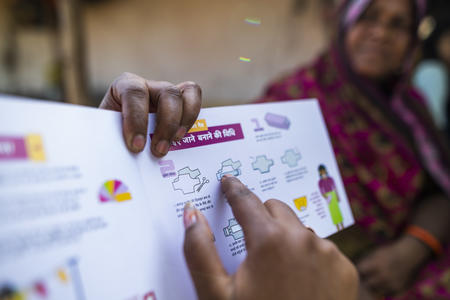Together with clean water and safely managed sanitation, good hygiene practices can dramatically improve – and even save – people’s lives.
Why good hygiene?
Upholding personal hygiene and ensuring cleanliness in our environment is essential for a healthy life. Incorporating good hygiene behaviour is paramount. At WaterAid India, our emphasis is on educating individuals about hygiene practices, specifically focusing on hand hygiene—emphasising handwashing at crucial moments—and safe handling of food and water to prevent contamination during consumption. Additionally, we address menstrual health and hygiene management to promote the overall well-being of women and adolescents.
Defining hygiene is challenging due to its broad scope, encompassing various behaviours such as personal hygiene (handwashing, food hygiene, and menstrual hygiene) and the proper use of toilets and safe water practices. Certain groups, particularly individuals with disabilities, young girls, women, and babies, are more vulnerable to the impacts of inadequate hygiene.
Our approach
At WaterAid India, we prioritise consistent nudges for key hygiene behaviour change through regular community meetings and hygiene sessions. Regular campaigns on global days act as catalysts in promoting these behaviours.
We address the issues of hand hygiene, handling of food and water, and menstrual health and hygiene management by focusing on essential components like thorough handwashing with soap for at least 30 seconds
To reinforce safe water practices and address the issue of food hygiene, we emphasise the need for efficient clean water storage to minimise contamination risks before consumption. We also promote practices such as washing utensils and vegetables before cooking thereby encouraging the community to cover items post-cooking for hygiene maintenance.
Lastly, the menstrual health and hygiene management sessions include dispelling myths and taboos related to menstruation. WaterAid India provides adolescents with comprehensive knowledge about menstrual biology as well as addresses informed product choices and menstrual waste management.
Key impact
One of the key focus areas of WaterAid India's work is hand hygiene, where we advocate for the practice of thorough handwashing at critical times. By promoting this simple yet effective habit, we aim to reduce the risk of infectious diseases and contribute to overall public health. Furthermore, our efforts extend to educating communities on the safe handling of food and water. This involves imparting knowledge on proper food preparation and storage techniques, as well as emphasising the importance of accessing and consuming clean and uncontaminated water. Through these initiatives, we aim to prevent the transmission of waterborne diseases and enhance the overall health of communities.
In addition to this, we also address the crucial aspect of menstrual health and hygiene management. Our programmes focus on breaking taboos, promoting awareness, and providing access to sanitary facilities and education. By doing so, we strive to ensure the well-being and dignity of women and girls.
The ripple effect of good hygiene
Maintaining robust personal hygiene practices and cultivating a clean environment are indispensable for fostering a healthy and thriving life. WaterAid India places a significant emphasis on instilling essential hygiene behaviours to empower individuals in safeguarding their well-being.
In essence, our holistic approach to hygiene education encompasses various themes, creating a comprehensive framework that empowers individuals and communities to adopt and sustain healthy practices in their day-to-day lives. Through ongoing education and awareness initiatives, we aim to foster lasting positive changes in behaviour that contribute to improved public health outcomes.




